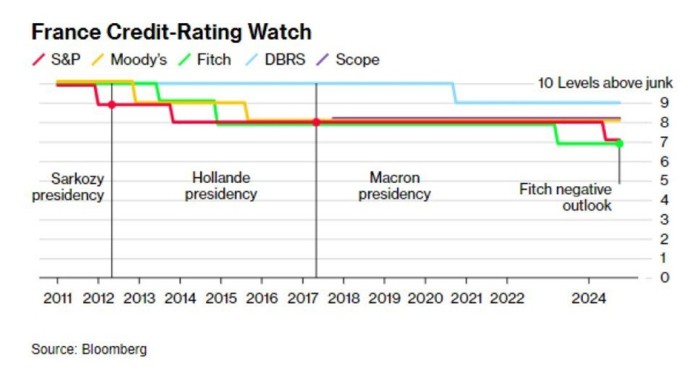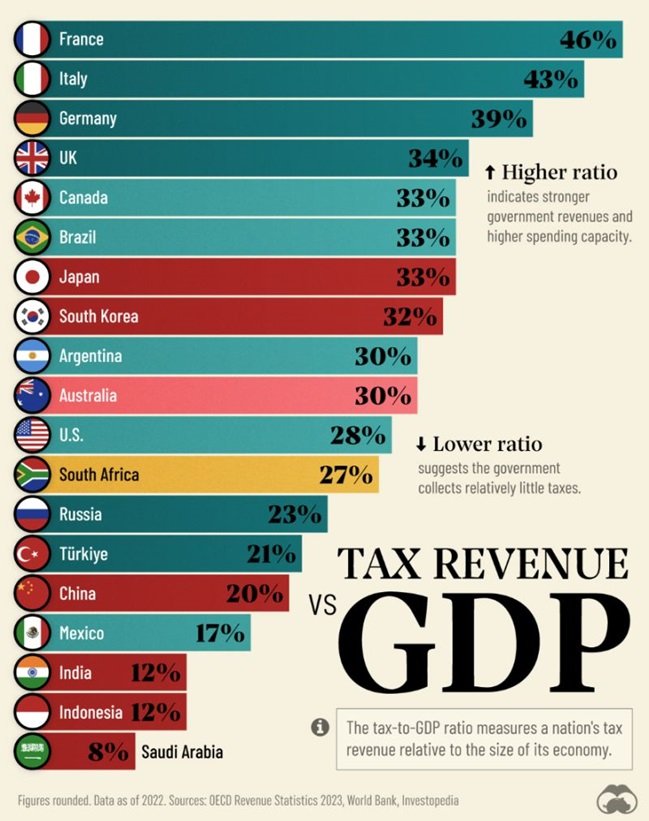Harry Geels: French public finances new challenge for the eurozone

This column was originally written in Dutch. This is an English translation.
By Harry Geels
The German industry is having a hard time due to too much regulation and competition from China. But the other linchpin of the eurozone, France, is also faltering, partly due to poor budget discipline. It's time for Europe to reinvent itself. Some starting points for a plan.
Fitch gave France a negative outlook on October 11 due to increased political and fiscal risks. Although the rating agency rated France at AA-, it expressed concerns about the development of public debt, which is expected to reach 120% of GDP in 2028. The news comes at a time when the new government is making austerity attempts. From a broader perspective, France's increasingly poor public finances are a problem.

Budgetary discipline is under pressure in many European countries. Most countries have long since ceased to comply with the (original) rules of the Stability and Growth Pact. And that actually starts with our southern neighbors. Belgium is also moving towards a budget deficit of 110% of GDP within a few years. Not to mention Italy and Greece. These are both above 140%, although we have seen improvements in Greece in recent years. But France is a problem because, together with Germany, it forms the core of the eurozone.
French-German axis
The euro is an agreement between France and Germany. France 'demanded' the introduction of the euro when East and West Germany wanted to reunite. Both countries have de facto called the shots when it comes to the euro. When the banks of both countries got into trouble in 2010 due to a possible default on government loans from Southern European countries, a euro rescue plan had to be drawn up. Mario Draghi's 'whatever it takes to save the euro' was as much a rescue of the euro as it was of the French and German banks.
However, 'euro pact' between Germany and France is under pressure. Germany has internal problems. The country is suffering from excessive bureaucracy, increasingly strong competition from China and 'Ostpolitik', in which the country, among other things, became too dependent on Russian gas. Many Germans are dissatisfied. In the last elections, more extreme parties such as AfD and the Sahra Wagenknecht Alliance received many votes. The only positives are the reasonable budget discipline (deficit of just under 3%) and the relatively low national debt.
But France also has similar problems. Inadequate economic growth, a stagnant labor market, an expensive and inefficient welfare state with increasing inequality (especially the differences between the 'corporate world' and the banlieues are dire). Public finances have been cyclical, but on balance deteriorated, especially after the introduction of the euro. The country rarely meets European budget requirements. The big problem is that France already has a very high tax burden: 46% of GDP. There is no financial room to stimulate the economy.

Germany has always helped France (indirectly) with all its problems, for example by supporting the ECB's purchase program (against German monetary discipline), dealing flexibly with the SGP budget requirements, and setting up joint support plans. The EU Recovery Fund, in which €750 billion was spent on Eurobonds, mainly had two major beneficiaries: Italy and France. The big question, now that things are getting worse in Germany, is how long that support for France (and the euro) will last.
Reinventing Europe
Europe has been outpaced on all sides by regions that are more economically integrated, work harder, have fewer regulations, have higher productivity growth, and have an optimum currency area. The increasing differences with the US and China are particularly poignant. It is not without reason that Mario Draghi recently presented a large-scale plan to help Europe get back on its feet. Although this plan has good points, it focuses too much on industrial policy and on even more (shared) debt.
A reinvention of Europe should consist of five key points, which of course need to be further explored:
- Innovation as an engine for growth: investments in R&D must increase and there must be more emphasis on innovation cultures and hubs, in collaboration with science.
- Review of education and skills: education must be taken to a higher level, by emphasizing top universities, digital skills and life-long learning.
- Less bureaucracy and, above all, more flexible labor markets: abolition of restrictive rules and box-ticking culture and, for example, the introduction of the Danish 'flexicurity' everywhere.
- Sustainability as a driving force: Europe must further expand its lead in sustainability, less through rules and standards, and more through free markets.
- Strengthening the internal market: Europe should place more emphasis on economic than political integration, with a focus on a competitive capital and banking union.
Euro
Finally, a comment about the eurozone, which is also far from complete. A common currency requires an efficient capital market, free and flexible labor markets, a transfer union (in case of shocks) and of course as many economically convergent euro countries as possible with a comparable budgetary culture. The Eurosystem in its current state – and that is blasphemy for the Eurochurch – is more of a problem than a solution for Europe. To save the euro or not, 'that is [also] the question.'
This article contains a personal opinion from Harry Geels
